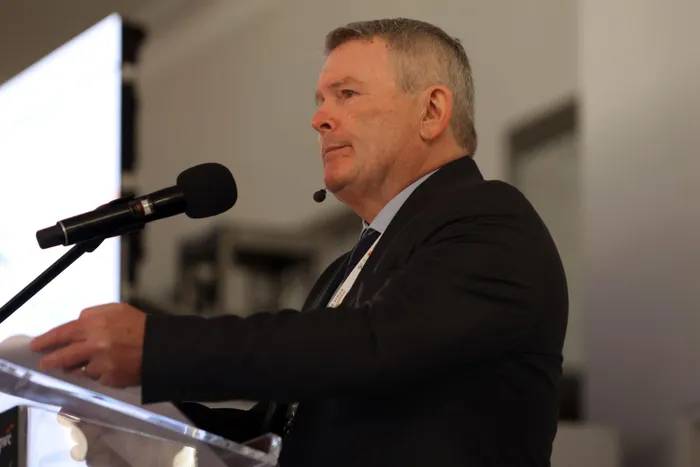
Minerals Council's President Paul Dunne speaking at the Joburg Indaba on Wednesday.
Image: Supplied
The Minerals Council South Africa has reiterated its warning that the proposed Minerals Amendment Bill, in its current form, could undermine the sector’s ability to attract investment, create jobs and stimulate growth.
The 2025 Mineral Resources Development Amendment Bill (MRDB), published for public comment on May 20, proposes significant amendments to the Mineral and Petroleum Resources Development Act (MPRDA) of 2002.
The draft law seeks to formalise artisanal mining, strengthen environmental and community consultation, promote mineral beneficiation, and enhance regulatory certainty for investors.
Among the proposed changes are a new licensing regime for small-scale mining, clearer definitions for “community” and “interested and affected parties,” and tougher enforcement mechanisms.
The Bill also addresses associated minerals, historic mine dumps, and suggests that petroleum resources may be separated into their own legislation.
Speaking at the Joburg Indaba on Wednesday, Minerals Council's President Paul Dunne said the Council has submitted detailed comments to government and expects the redrafting process to continue into next year.
"It is our considered view that the proposed Minerals amendment Bill in its original form does not encourage or sustain the growth and investment that the mining industry needs to realise its full potential to create employment, to stimulate the economy and to fulfil its social mandate," Dunne said.
"The mining industry has made significant contributions to transformation to address the historical injustices of the past. These contributions were made despite the industry facing headwinds of a difficult operating and regulatory environment, which has reduced the contribution of mining from historic levels."
The Bill has faced a backlash not only from the mining industry as the agricultural sector has also raised alarm over potential risks to food security, and rural sustainability.
In August, AgriSA said the Bill introduces provisions that would allow artisanal and small-scale mining (ASM) operations to access private agricultural land without any guidance as to how meaningful consultation should take place or on compensation requirements.
AgriSA said this undermines constitutionally protected property rights and threatens the viability of farming operations, particularly in high-potential agricultural zones, adding that the absence of cumulative environmental impact assessments and enforceable rehabilitation guarantees further exposes landowners to long-term degradation without remedy.
Meanwhile, Dunne stressed that a conducive policy framework was key to unlocking further investment as developing a single large mine can take up to 10 years and cost around R20bn — requiring substantial external financing.
He said the Council will continue to work closely with government to ensure rational, investor-friendly policies on issues such as the Minerals Amendment Bill and the proposed chrome export tax.
"The mining industry has enormous untapped potential in the minerals we already mine and the minerals of the future, provided we can unlock exploration and attract investment. The Minerals Council will not relent in lobbying and advocating for the best possible regulatory and operating environment to realise this potential for the benefit of our shareholders, employees, communities and the broader economy," Dunne said.
"We are fully engaged with government on the legislative issues at hand including the proposed amendment bill and the chrome export tax issue. It is extremely important for both investment and job creation that rational outcomes prevail, and not inappropriate policy responses to misdiagnosed problems."
Dunne said the growth of the country’s mining industry and the transformation of the economy are “inextricably intertwined,” warning that without a stable and predictable regulatory environment, both objectives are at risk.
He said that mining remains a cornerstone of South Africa’s economy — employing 465 000 people, contributing 6% to GDP, and accounting for R800 billion in exports, or 45% of total exports.
“Mining matters is not just a slogan — it’s a fact,” Dunne said, highlighting that mining companies also make up nearly a third of the JSE Top 40 by market capitalisation and contribute R43bn in corporate tax, about 14% of total corporate tax collection.
“It is critical for mining companies and investors, throughout the value chain, to have a pragmatic, stable regulatory environment that attracts investment rather than discourages it by onerous, globally uncompetitive policy.”
Despite facing regulatory uncertainty, infrastructure bottlenecks, and the lingering effects of State Capture on electricity, rail and ports, Dunne said the mining sector has continued to drive transformation.
BUSINESS REPORT